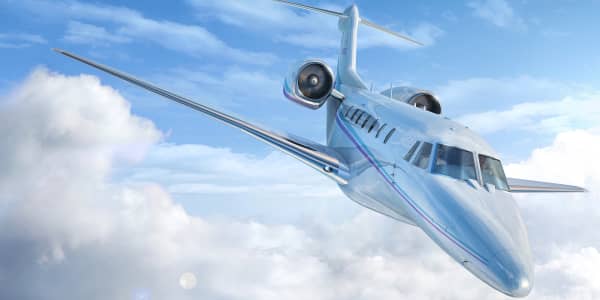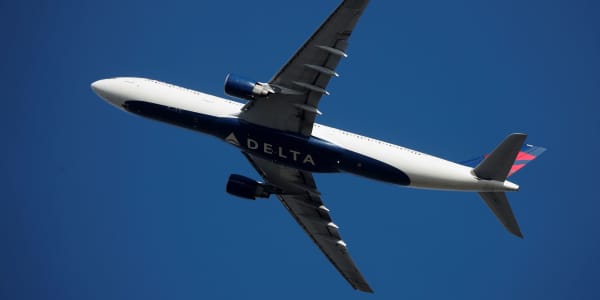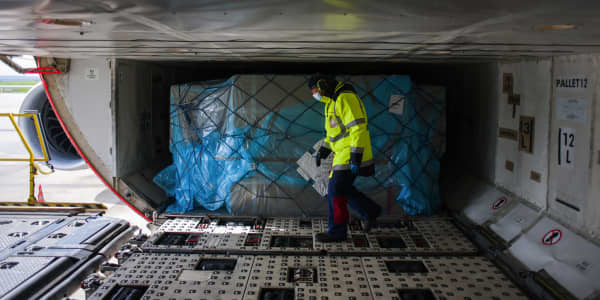Ryanair's inflammatory boss, Michael O'Leary, may only just have realized that customer care is important to a long-lasting business, but his protégées in the Middle East are way ahead of him.
While the orders for Boeing and Airbus aircraft from Etihad Airways, Emirates and Qatar Airways have been the talk of the town, the Middle Eastern low-cost carrier flydubai, which is owned by the Emirates Group, also made a sizeable order.
The budget airline ordered 100 Boeing 737 Maxs along with 11 737-800s on Sunday, a deal valued at $11.4 billion and constituting the largest Boeing single-aisle order by a Middle Eastern airline.
The deal is a necessary step for flydubai, which clearly views the low-cost carrier (LCC) market as an untapped source in a region where the legacy airlines dominate. The Middle East is only just beginning the see the beginnings of a budget travel revolution that has already taken place in the Europe and the U.S.
(Read more: Gulf carriers don't prefer Boeing: Airbus)
Not that flydubai is like its European and American counterparts like Ryanair, Southwest or Jet Blue. Ghaith Al Ghaith, CEO of flydubai, spoke to CNBC aboard one of his aircraft at the Dubai Air Show and explained how on flydubai you can pay 25 AED ($6.81) for in-flight entertainment. You can now even fly business class.
That's right: business class on a budget airline. At a time when Ryanair only recently agreed to allow free reserved seating and when Spirit Airlines just introduced "wine in a can" for passengers.
"It takes us through our evolution," Al Ghaith said, "because we are a Dubai airline. We know that there is always an opportunity to excel and introduce services that are usually not common in the class that we are in. That is why when we started the airline it was more unique. When we introduced our television service, that was unique. Business class was the same extension."
He continued, "Business class is a reflection of our Dubai position because Dubai is the capital of business in this part of the world, and from what we have seen from the market, we fly to 66 destinations and for 44 of those destinations, there is not a proper business class service."
For example, if you were to fly from Dubai to Bahrain leaving on Saturday 30 November and returning on Monday 2 December, it would cost 2,405 AED ($654.78) return. That price includes 15kg of hand baggage, 40kg of checked baggage, in-flight entertainment and a meal.
(Read more: The Middle East: The new aviation hub?)
Flydubai was founded in 2008 and this year alone launched 15 new destinations. The Boeing order at the air show is a testament to its extraordinary growth in the last five years. Flydubai has pushed out many competing carriers at Dubai International Airport's Terminal 2.
Shaikh Ahmad Bin Saeed Al Maktoum, the Chairman and Chief Executive of Emirates Airline and Group (which owns flydubai) suggested at the air show that either the budget carrier or Emirates will move all its operations to the new Al Maktoum International airport by 2020.
Luxury add ons
Al Ghaith said that the European and American LCCs were the pioneers and that he always took a careful look at what they were doing. Yet, budget air travel in the Middle East was a different ball game.
"We are unique to the place we are operating from, especially the GCC, UAE and Dubai, because we have to offer what we believe is unique to this market," Al Ghaith told CNBC. "In Europe and America, you have one product, one customer and one market, so it is easy to have commonality across. Here, it is not the same. In Dubai, there are over 200 different nationalities. So you have to provide services for different people, the market is not always the same. so that's why we cannot afford to have one product."
Indeed, innovation in this market is key. Chief Economist at Ascend, an aviation advisory service, said, "I think any kind of business model needs to be refreshed and revitalized from time to time because the market conditions which generated it never stay the same."
(Read more: )
While Ryanair and other Western budget airlines are known for their "annoying" add-ons which charge you for failing to print off your boarding pass at home, for example, flydubai has pioneered "luxury" add ons. It makes money from passengers by offering them a variety of means to upgrade their comfort levels. You don't pay extra for anything basic.
"The television we offer, it is cutting edge, with an HD screen, it's very efficient, but passengers have to pay for it," Al Ghaith said, adding, "We make money from this system selling it on board. We break even, sometimes even make money. Everything we do has to make money."
And flydubai has admirers in Europe. Carsten Schaeffer, Lufthansa's Vice President for sales and services in south east Europe, Africa and the Middle East, said the flydubai model was a very interesting proposition in the LCC marketplace.
"I flew flydubai from Jeddah to Dubai the other day, and our COO was on board as well," Schaeffer told CNBC. "That's a totally fantastic product. It gets you from A to B in a three hour flight, even the catering prices are reasonable if you want a sandwich on board. It gives you what you're looking for from A to B. There is a need and there will be a demand."




